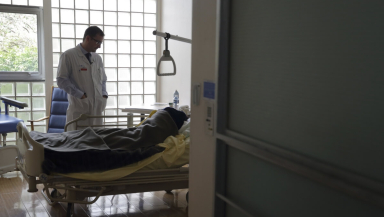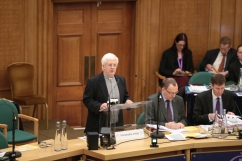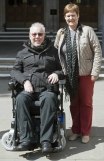
In September, MP Rob Marris will introduce a Private Member's Bill into the House of Commons designed to allow doctors to assist in the suicide of patients with a terminal illness. Those in favour of this Bill argue that it will allow a small number of determined individuals who wish to kill themselves to be given a medically and legally approved method to achieve their wishes.
The supporters of the Bill use deliberately soft-sounding language such as "assisted dying" to make it sound gentle, natural and compassionate. In reality what is being proposed is a major change in the law on intentional killing and a major change in medical practice.
At present doctors have to operate under exactly the same law as everyone else. They are prohibited both from killing and from assisting a patient's suicide. But it is being proposed that under certain circumstances doctors will have, like James Bond, a "double O prefix". They will be allowed to select a poison of their choice, calculate the lethal dose, ensure that the patient has the drug, advise the patient on how to take the drug for maximum lethal effect and to avoid complications like vomiting, even insert an intravenous line for the drug to be given efficiently. However the doctor must step back from the final act. The patient must take the lethal drug themselves.
It is often suggested that doctors are helping people to die every day and all that is being proposed is a regularisation of the law. But this, I am afraid, is a downright lie. The drugs that palliative care doctors use are designed to treat pain and anxiety but they are not designed to kill. The drugs used in assisted suicide are completely different from those used by palliative care doctors. They are drugs designed to kill, rapidly and cleanly. Drugs called barbiturates are usually used in massive overdose, 50-100 times the normal therapeutic dose. These drugs are never used in palliative care precisely because they are dangerous. In palliative care the intention is not to kill, or to deliberately hasten death. Instead the intention is to treat pain and distress so that the precious last hours, days and weeks of life can be as valuable as possible. The intention of the doctor is revealed by the drugs that are selected.
At present, the prohibition on intentional killing provides a protection for patients and for doctors, who may come under intense pressure to bend the law and hasten death. But once assisted suicide is legalised then both doctors and patients will find themselves under covert pressure. Even those promoting a change in the law have recognised this. Pressure on terminally ill patients to kill themselves might come from family members or medical professionals, but it may also be self-imposed, especially for those who feel that they are being a burden on others.
It is common to find elderly people who are concerned that they are becoming an unwanted and expensive burden on their relatives and carers. Wanting to act responsibly, they may come to think that it would be better for everybody if their life ended. There is a deep and tragic irony that it is precisely those elderly people who are most sensitive to the needs and concerns of others who may be most at risk of being emotionally manipulated into taking their own lives.

At present it is being proposed that assisted suicide should only be available for those who have a terminal illness with less than six months to live. This is ironic, because most of the tragic cases that have aroused public sympathy and calls for a change in the law, would not qualify for assisted suicide under the new Bill.
It is inevitable that there would be continuing legal and media pressure to extend the right of assisted suicide to those who are suffering greatly without terminal illness, including those with untreatable psychiatric distress, and those with dementia and other forms of disability. Imagine a society which quietly encouraged the elderly, the isolated or the disabled to take their own lives. Where doctors made available lethal mixtures for their patients, where the desperate and lonely were encouraged to get on with it. Is this a society we wish to belong to?
In Christian thinking we are not just individuals making choices and doing our own thing. We are locked together in community, bound together by duties of care, responsibility and compassion. Respect for life, and the prohibition of suicide and killing, is part of the glue which binds society together. It is the way we have been made, and this is the way that the common good can be promoted and protected.
Professor John Wyatt is a leading expert on end of life issues and a former chair of the medical study group of the Christian Medical Fellowship (CMF). He is the author of a new study guide on death and dying called Finishing Line.

















